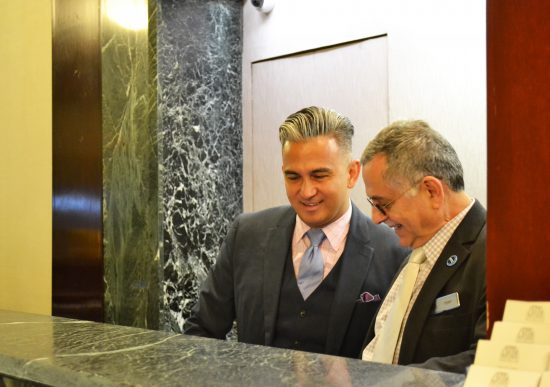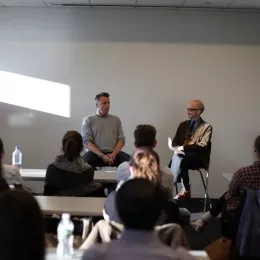Why should I get a culinary or hospitality education? Can’t I just get a job and learn the business while I work? What a great question and one that should be asked. I hear this almost weekly. As a dean and instructor at ICE, I often meet dreamers who are navigating the very intense process of looking down a long, unpaved and rocky road to the future, evaluating what can only be termed a “seismic” career change.
Some may have MBAs or JDs with significant experience and incomes in other fields. A few may have families with kids at home. Others might be reentering the business world after a hiatus. And there are also those who are entering the work world for the very first time. Though they come from different places, they have similar a goal: a career in culinary or hotels.

So let’s examine the above question and see if there is an easy answer. News media and blogs continually publish stories about the shortage of talented people in our industries. Restaurants and hotels have an unquenchable thirst for talent in both front-of-house and back-of-house.
It seems like a no-brainer: find a conveniently located restaurant or hotel, get a job and then begin the learning process under the supervision of a current business operator. This may be doable. You may encounter a few slammed doors before one opens to accept you — after all, you have little or no experience. But eventually, someone will probably hire you.
Now what? You will be in an entry level job focused on hourly or daily tasks at hand. Sure, you will be learning, but your knowledge horizon will be narrow and opportunities for bigger perspective far off. The larger, more important question should be where are you being taught and who is teaching you.
More likely than not, you’ll be learning in a local operation from someone who has come up in the business one step at a time and just knows his/her way of doing it. In some cases, there may be a few company procedures to help in daily operations, but the reality is: you will learn someone’s current knowledge, not necessarily the best or only way, but someone’s way. Not to mention, your hoped-for mentor has little or no time to train, viewing you as somewhat of a burden. Why care?
Further, should you care if your place of employment is doing great? In short: YES. Definitely, you should care a lot. Most operators of individual restaurants, local hotels and small business groups do not know how to operate with maximum efficiency. They don’t know all of the small things that can make a giant difference between marginal and profitable — not to mention, they aren’t necessarily aware of the newest technology and key industry issues.
Many managers in small hotels and food businesses have a singular approach. In fact, often these people don’t know what they don’t know. Learning the right way as well as alternate ways to operate is vitally important to succeed in businesses that at best are competitive and at worst, complicated, multifaceted, but seemingly easy.
Here’s another secret. Learning how to cook and how a kitchen works is a valuable asset, but knowing how to run the full business with all its operational controls, labor issues, purchasing systems, financial aspects, new technologies, marketing and social media opportunities, etc. will be a major advantage when compared to your competitor who began as a restaurant prep cook or hotel desk clerk and worked upward for years in an environment with limited exposure.
In the end, to be a success, whether as a business owner or a senior manager/chef for someone else, making a profit will be the key. Several well-known guest chefs who recently visited ICE told our classes that they wished they knew more of the business side when they started out.
So, are culinary and hospitality programs the answer? In many cases, the answer is yes. It’s an opportunity to learn the best approaches from experienced pros whose only job is to teach. Plus, a school provides a network of contacts and expertise you can call on long after you leave. It’s like having a personal group of mentors who will be there to give advice and shadow you as long as needed.

Is school always the answer? Not for everyone. It’s not inexpensive. Personal financial situations may make it challenging as an option. And, there is the question, “Why should I spend thousands on an education when I will be earning a small salary after graduation?”
The answer is: if you view the education as your entry for a job, that’s not why you enroll. You go to school for a career not just a job. The first job isn’t the end game. It’s a valuable step on the ladder. Now, you might be thinking: he’s an educator. Of course he thinks school is a great route. Yes, that’s true, but I’m also a former owner/operator of multiple food businesses and have consulted and mentored many others. I’ve learned through experience how many opportunities are squandered by surprisingly well-known businesses. In many of these situations, just a bit more knowledge could make things better.
Whether you choose formal education, practical experience or a combination of both, there is no assurance you will succeed. There are many other factors that influence success, and not everyone’s goals are the same. Hopefully with your learned ability and knowledge, the first job will be a quick step. What is learned in formal education should make that rocky road smoother and your speed faster to get to where you want to go.
Interested in learning more about ICE's Restaurant & Culinary Management program? Click here for more information.




